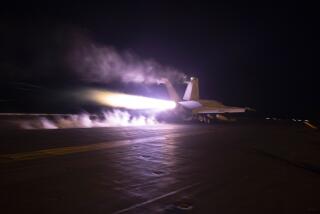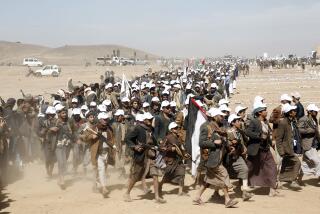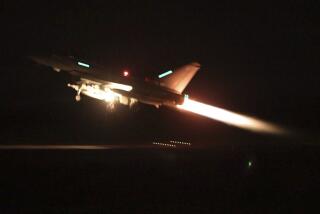Britain Says It Might Aid Raids Again : Won’t Exclude Use of Bases by U.S. for Libya Attack
- Share via
LONDON — British Foreign Secretary Geoffrey Howe refused Sunday to rule out the possibility of U.S. aircraft launching another air strike against Libya from bases in Britain.
Asked during an hourlong, nationally televised interview if Prime Minister Margaret Thatcher’s government would consent to the use of British bases again, Howe replied, “That cannot be absolutely excluded in the nature of the world in which we live.
“Britain is in the front line of Libyan-directed state terrorism,” he declared.
The British government is expected to make a strong case for the adoption of more effective measures against terrorism by all members of the European Communities at a foreign ministers’ meeting in Luxembourg today.
President Reagan ordered last Tuesday’s raid, employing Navy carrier-based aircraft as well as Air Force warplanes from the British bases, after reviewing what Administration officials called “irrefutable proof” of Libyan responsibility for the April 5 terrorist bombing of a West Berlin nightclub popular with American GIs.
Howe made his Sunday statement against a backdrop of vocal and widespread public disapproval here of the American raid and the British government’s active support for it.
There were protest demonstrations outside the U.S. Embassy in London and at military bases in central and northern parts of England where U.S. forces, including the U.S. F-111 supersonic fighter-bombers used against Libya, are stationed.
It was another day of public protests against the attack, but Sunday’s turnout was smaller than Saturday’s. There were 116 arrests, but no violence was reported.
Polls Show Opposition
Unlike the United States, where public support for the raid has been strong, opinion polls here have shown that roughly seven out of every 10 Britons were against the U.S. attack. Howe’s television appearance was part of a concerted public relations effort by the Thatcher government to generate greater backing for its tough stance against Libya--by far the strongest of any U.S. ally in Europe.
In the course of the interview, Howe stressed the link between the need for strong action by the 12 Common Market nations against Libya and reducing the possibility of further U.S. military action.
Howe and other senior Foreign Office officials have consistently argued that tough, clear-cut diplomatic moves against Libya by the European countries would ease pressure for military action by Washington.
In two Common Market foreign ministers’ meetings last week, Britain’s efforts for decisive, collective European action were defeated, but the American air raid is believed to have spurred a greater sense of urgency to invoke tougher measures at today’s foreign ministers’ meeting in Luxembourg.
That meeting is expected to discuss a lengthy report on Libyan-sponsored terrorism that was commissioned last January.
“There was lots of talk (at Thursday’s emergency foreign ministers’ meeting in Paris) that Europe must be credible,” a British Foreign Office official said. “We say, ‘Fine, but put your money where your mouth is.’ ”
Broke Ties With Libya
Britain, which broke diplomatic relations with Libya two years ago, has urged the 11 other Common Market countries to close down Libyan embassies in their capitals and to improve international anti-terrorism cooperation among police forces to help counter the Libyan threat.
At a meeting one week ago, the foreign ministers agreed only to reduce the size of the Libyan diplomatic missions, introduce tougher visa controls on Libyan nationals and impose a ban on arms sales to Libya.
In an effort to spur the foreign ministers to take stronger action, Britain is expected to present additional evidence of Libyan-sponsored terrorism in Europe to them today.
“It will be presented in a convincing way,” a Foreign Office official said.
This official described what he termed “a loose coalition of interests” among the Mediterranean countries of Italy, Spain and Greece that made them reluctant to endorse strong measures against Col. Moammar Kadafi’s regime. However, he stressed that Greece has expressed the greatest skepticism.
“The Spanish have been very critical of the U.S. action, but the Greeks stand apart in a category of their own,” the official said. “Only the Greeks are unsure whether the evidence (against Libya) is valid.”
Foreign Secretary Howe on Sunday reiterated British policy that “more collective action can be effective in deterring and preventing the maintenance and growth of Libyan terrorism. That’s why we attach so much importance to the response the alliance makes.”
As Howe spoke, demonstrators, mainly from leftist political parties and Britain’s large Muslim community, gathered at the U.S. Embassy in London to protest the U.S. raid on Libya. Although the London protest broke up peacefully, 53 demonstrators were reportedly arrested after trying to break through a perimeter fence of a U.S. Air Force communications center at Menworth Hill.
Five people were arrested when 2,000 protesters gathered outside the Royal Air Force base at Fairford, 25 miles west of Oxford.
Meanwhile, it was reported that a 32-year-old Irish woman, Anne-Marie Murphy, who attempted to carry a bomb aboard an El Al Israel Airlines jumbo jet at London’s Heathrow Airport last Thursday, was under heavy guard at an undisclosed London hotel. Detectives continued to question her Jordanian boyfriend, who they believe planted the bomb in her hand luggage without her knowledge.
In Turkey, meanwhile, U.S. Embassy officials said they suspect Mohammed Abdulmalik, Libya’s ambassador to Turkey, of involvement in what police have described as a foiled bomb attack on a U.S. military officers’ club in Ankara, United Press International reported.
Four Libyans were arrested Friday in the attempt, police said.
“All lines lead back to Abdulmalik,” one embassy official charged, adding that the Libyan diplomat previously served in the United States and Switzerland but was asked to leave both countries for activities incompatible with his diplomatic status.
More to Read
Sign up for Essential California
The most important California stories and recommendations in your inbox every morning.
You may occasionally receive promotional content from the Los Angeles Times.










